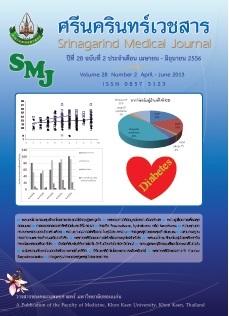Clinical outcomes of Cardiac Resynchronization in patients with Advanced Heart Failure at Faculty of Medicine, Khonkaen University, Khon Kaen, Thailand
Abstract
Background and Objective: Heart failure is a serious problem and has high mortality rate, especially in patients with severe symptoms who do not respond to pharmacological treatment. There is much evidence that cardiac resynchronization therapy (CRT) is effective for these patients. This study aims to know the effect of CRT on patients with severe heart failure in the northeast of Thailand.
Methods: This study is one group pretest-posttest retrospective study. Data were collected from patients with severe heart failure, whom were treated with CRT during February 2009 to October 2011 at Queen Sirikit Heart Center of the Northeast, Faculty of Medicine, Khon Kaen University. Mortality rate and cause of death , number of hospital admission per year with heart failure , NYHA functional class , LV ejection fraction , QRS duration before and after CRT treatment were compared.
Results: 18 patients underwent CRT implantation. 4 patients (22.22%) died from any cause (All-cause mortality) within 12 months after implantation. In the remaining 14 patients, at 12 months after implantation, the median number of hospitalization with heart failure per year was significantly decreased from 2 to 1 times / year (p<0.05). At 6 months follow up after CRT implantation, NYHA functional class was improved from functional class 4 to 1 (p<0.05), LVEF was increased from 25.34 to 32.22 % (p=0.055), and QRS duration was decreased from 160 to 148 msec (p<0.05).
Conclusion: CRT implantation was significantly reduced the number of heart failure hospitalization per year with improvement of functional class and QRS duration. The mortality rate was similar to previous studies.




